![]()
![]()
![]()
Use LEFT and RIGHT arrow keys to navigate between flashcards;
Use UP and DOWN arrow keys to flip the card;
H to show hint;
A reads text to speech;
35 Cards in this Set
- Front
- Back
- 3rd side (hint)
|
doze off |

Phrasal verb To sleep lightly especially for a short period of time.
A few students dozed off during the movie.
Doze: He was dozing [=napping] on the sofa when I got home.
|
Drzemka |
|
|
solicitude |

Noun Concer that someone feels about someone's healt, happines, ect.
He expressed solicitude for my health. |
troska ( o kogoś), dbałość |
|
|
fussy |

Adjective Very careful or too careful about choosing or accepting things: hard to please
A fussy shoper She's always been fussy [=picky] about food. I'm not fussy about where we eat.
2. US Often upset or unhappt |
wybredny, marudny, humorzasty, kapryśny |
|
|
to hover |

Verb 1. To float in the air without moving in any direction
Helicopters hovered above us. Bees hovered around the hive. Watch as the hummingbird hovers over the flowers.
2. To stay very close to a person or place
Waiters hovered near our table. Nervous mothers hovering over their child.
3. Always followed by an adverb or preposition: a) To stay near a specified point or level
Unemployment rates were hovering around 10 percent.
b) to be or remain in a specifiedstate or condition
The patient was hovering between life and death. |
unosic sie, wahac sie |
|
|
chore |
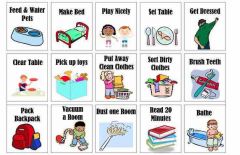
Noun
1. A small job that is done regularly
The children were each assigned digferent household chores. Farm chores. I like the simple chore of bringing in the firewood.
2. a dull, unpleasant, or difficulty job or experience
Doing taxes can be a real chore. That movie ia a chore to sit through. |
obowiązek, udręka, męczarnia, nieprzyjemna praca |
|
|
broom |

Noun 1. a brush that has a long handle and that is used for sweeping floors 2. a type of bush that has long, thin branches and yellow flowers |
Miotła |
|
|
smitten |

Adjective 1. In love with someone or something
From the moment he saw her, he was smitten. He was smitten with her from the moment he laid eyes on her. I was smitten by his good looks.
2. suddenly affected by something (such as strong emotion or a serious illness) -usually + by or with
He was smitten by disaster. She was smitten with terror. |
oczarować, zachwycić, zakochany, zadurzony |
|
|
envious |

Adjective : feeling or showing a desire to have what someone else has : feeling or showing envy envious neighbors an envious look — often + of His neighbors were envious [=jealous] of his success. en·vi·ous·ly adverb We looked enviously at his new car. |
Zazdrosny, zawistny |
|
|
severe |
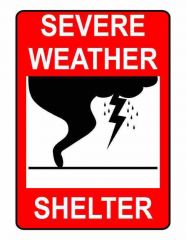
Adjective 1 a : very bad, serious, or unpleasant severe weather conditions The storm caused severe damage to the roof. a severe economic depression The patient is in severe pain. children with severe learning disabilities In the most severe cases, the disease can lead to blindness. b : causing a lot of physical pain or suffering He suffered a severe head injury. a severe cold/infection severe burns/wounds 2 : very harsh He faces severe penalties for his actions. The punishment was severe. severe criticism a severe critic 3 : requiring great effort The war was a severe test of his leadership. a severe challenge 4 : very formal, strict, and serious a severe young woman He's very generous despite his somewhat severe manner. 5 : not having much decoration : very plain a very severe style of architecture severe clothing a severe hairstyle Other forms: se·ver·er; se·ver·est se·vere·ly adverb severely injured/punished The accident has severely limited her mobility.
Synonyms: austere, authoritarian, flinty, hard, harsh, heavy-handed, ramrod, rigid, rigorous, stern, strict Antonyms: forbearing, indulgent, lax, lenient, tolerant |
Silny, ciezki, ekstremalny (o pogodzie), srogi surowy (kara), surowy (osoba), uporczywy, bezwzgledny, drakoński, |
|
|
crutch |
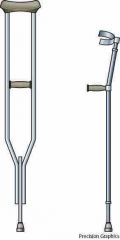
Noun crutch \ˈkrʌtʃ\
1 : a long stick with a padded piece at the top that fits under a person's arm — usually plural
◇People who have difficulty walking often use crutches to help them walk.
He's able to walk short distances with crutches but prefers his wheelchair. I was on crutches [=I was using crutches to walk] for six weeks after I broke my leg. — see picture at hospital
2 usually disapproving : something that a person uses too much for help or support She eventually realized that alcohol had become a crutch. [=that she was drinking too much alcohol as a way of dealing with her problems]
3 Brit : crotch Other forms: plural crutch·es |
krocze, krok (w spodniach), kula inwalidzka, szczudło, oparcie, podpora (np. o wierze, przyjaciołach) |
|
|
to reckon |

Verb 1. to think or suppose (something) to believe that (something) is true or possible
I reckon that we'll have to leave early. Do you reckon you'll be able to go to the grocery store after wor? We'll have to leave early, I reckon. Do you think it will rain? Reckon so [= I think it will]
2. to calculate or guess (an amout, number, value, etc.) : to have or form general idea about (something)
They reckoned that they would reach their destination by noon. I reckon [=estimate] the height of the building to be 70 feet. Losses were reckoned to be ober a million dollars.
3. to think of (someone or something) as being something specified - usually used as (be) reckoned
She was reckoned [=considered] to be among the group's leaders. = She reckoned as one of the group's leaders. |
myśleć, sądzić, przypuszczać, szacować z grubsza, uważać coś lub kogoś za coś, liczyć, kalkulować, rachować wyrównać rachunki, rozliczyć się z kimś, wliczać kogoś/coś |
|
|
hype |

noun
[noncount] informal + often disapproving : talk or writing that is intended to make people excited about or interested in something or someone
There was a great deal of media hype surrounding the senator's announcement. After months of promotional hype, the band finally released their new album. |
szum medialny, przesadna, krzykliwa reklama, narkoman, narkomanka |
|
|
frill |

Noun [count] 1 : a strip of cloth that is gathered into folds on one edge and attached to something (such as clothing or curtains) as a decoration
The dress had frills around the hem and sleeves.
2 : something that is added but is not necessary
He likes plain food without any frills. — see also no-frills
Other forms: plural frills Synonyms: flounce, ruffle, furbelow |
falbana, kreza, żabot, plisa |
|
|
to hype |

verb [+ obj] informal + often disapproving : to talk or write about (something or someone) in a way that is intended to make people excited or interested
He's being hyped (up) as the next big rap star. Company executives have been hyping the new software for months.
Other forms: hypes; hyped; hyp·ing |
robić szum (wokół czegoś), rozdmuchać (sprawę, temat) podbijać cenę, stymulować (np. gospodarkę, rynek) |
|
|
gruesome |

adjective
[more grue*some; most grue*some] : causing horror or disgust
The police report described the scene in gruesome detail.
a gruesome murder
grue·some·ly adverb
She was gruesomely murdered. grue·some·ness noun [noncount]
Synonyms: appalling, atrocious, awful, dreadful, frightful, ghastly, grisly, horrible, hideous, horrendous, horrid, horrifying, lurid, macabre, monstrous, nightmarish, shocking, terrible |
makabryczny, okropny, straszny, |
|
|
banshee |

noun
[count] : a female spirit in Irish and Scottish stories who cries loudly to warn people that someone is going to die soon
I heard someone wailing/screaming like a banshee.
Other forms: plural ban·shees |
Zjawa zwiastujaca smierc |
|
|
to snipe |

Verb
1 [no obj] : to shoot at someone from a hidden place
Enemy fighters sniped at them from vacant buildings.
2 : to criticize someone or something in a harsh or unfair way
[no obj] — usually + at
The candidates have been sniping at each other in speeches. [+ obj]
One of the senators sniped, “What does he think this is, a monarchy?”
Other forms: snipes; sniped; snip·ing |
strzelać z ukrycia (do kogoś) krytykować (kogoś), naskakiwać (na kogoś) |
|
|
to bid |

Verb
1 past tense and past participle bid a : to offer to pay (a particular amount of money) for something that is being sold : to make a bid at an auction [+ obj]
I'll bid $100 for/on the lamp but no higher. The auctioneer said, “What am I bid [=offered] for this lamp?” [no obj] He plans to stop bidding if the bids go over $500. She bid for/on a desk and a chair. The two brothers bid against each other for the same chair. [=they each tried to buy the chair by repeatedly making higher bids than the other one had made]
b [no obj] US : to offer to do work for a particular price Several local companies are bidding for the same job. His company bid on the snow removal contract.
2 past tense and past participle bid : to say how many points you are trying to win in a card game [+ obj] He bid two. [no obj] He bid and I passed.
3 [+ obj] formal : to order or command (someone) to do something
We did as we were bid/bidden. She bid/bade them enter. [=told them to come in] — see also unbidden
4 [+ obj] formal : to express (greetings or good wishes) to (someone) : to say (something, such as “good morning,” “good evening, etc.”) to (someone)
They bade me farewell. = They bade farewell to me. [=they said goodbye to me] |
licytować, składać ofertę (na aukcji) składać ofertę (w przetargu) licytować (w grze w karty) |
|
|
bid |

Noun
1 a : an offer to pay a particular amount of money for something
Bids for the painter's work have been quite high at recent auctions. She had the highest bid. He made a bid of $100 for the painting. He made the opening bid.
b : an offer to do a job for a particular price The company is accepting bids for the renovation project.
2 : an attempt to win, get, or do something
The company is facing a takeover bid. [=someone is trying to gain control of the company by buying most of its stock] — often + for
Two convicts made a dramatic bid for freedom but were soon recaptured. They made a strong bid for the championship. a bid for power/reelection — often followed by to + verb They failed in their bid to close the school.
3 : a statement of how many points a player is trying to win in a card game
Other forms: plural bids Synonyms: attempt, crack, endeavor, essay, fling, go, pass, shot, stab, trial, try, whack, whirl |
oferowana cena, oferta (na aukcji) oferta (składana w przetargu) odzywka (w grze w brydża) próba (zdobycia lub osiągnięcia czegoś) |
|
|
hyphen |

hy·phen \ˈhaɪfən\ noun [count] : a punctuation mark - that is used to connect words or parts of words Other forms: plural hy·phens |
Kreska, łacznik, dywiz |
|
|
to mingle |

min·gle \ˈmɪŋgəl\ verb 1 : to combine or bring together two or more things [+ obj] The story mingles fact and/with fiction. [no obj] Several flavors mingle in the stew. It's a story in which fact mingles with fiction. 2 [no obj] : to move around during a party, meeting, etc., and talk informally with different people The host was too busy to mingle during the party. — often + with The speaker stayed to mingle with the audience after the lecture. — see also intermingle Other forms: min·gles; min·gled; min·gling Synonyms: amalgamate, combine, commingle, fuse, incorporate, integrate, intermingle, intermix, merge, blend, mix Antonyms: break down, break up, separate |
przyłączać (się), mieszać (się), obracać (się w towarzystwie), łączyć |
|
|
to sizzle |

siz·zle \ˈsɪzəl\ verb [no obj] 1 : to make a hissing sound like the sound water makes when it hits hot metal bacon sizzling in the pan
2 chiefly US, informal : to be very exciting, romantic, etc. Their romance sizzled throughout the whole summer. The book sizzles with excitement.
Other forms: siz·zles; siz·zled; siz·zling sizzle noun [singular]
I heard the sizzle of frying bacon.
Synonyms: fizz, hiss, swish, whish, whiz (or whizz) |
Skwierczeć |
|
|
elsewhere |
else·where \ˈɛlsˌweɚ\
adverb : in or to another place
The angry customer said he would take his business elsewhere.
Elsewhere in the same book she gives another date. The parts are produced elsewhere. |
Gdzie indziej |
|
|
elsewhere |
else·where \ˈɛlsˌweɚ\
adverb : in or to another place
The angry customer said he would take his business elsewhere.
Elsewhere in the same book she gives another date. The parts are produced elsewhere. |
Gdzie indziej |
|
|
drawdown |

ˈdrɔːdəʊn/ noun 1. a reduction in the size or presence of a military force. "the unit is the first to leave Germany as part of the drawdown" an act of drawing on available funds or loan facilities. "a drawdown on investment capital" a withdrawal of water, oil, or gas from a reservoir or repository. noun: drawdown; plural noun: drawdowns; noun: draw-down; plural noun: draw-downs "drastic drawdowns can render shorelines unusable for other economic activities and largely uninhabitable for wildlife" 2. a decline in an investment or fund. "the drawdown seemed to be concentrated in the smaller hedge funds" |
Spadek wartości |
|
|
transient |
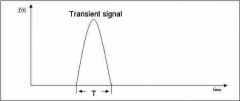
tran·sient \ˈtrænzijənt\ adjective [more tran*sient; most tran*sient] formal
1 : not lasting long transient joys
2 : staying somewhere only a short time
a transient population transient guests
tran·sience \ˈtrænzijəns\ noun [noncount]
the transience of fame/joy transiently adverb Synonyms: ephemeral, evanescent, flash, fleeting, fugitive, impermanent, passing, short-lived, temporary, momentary, transitory Antonyms: enduring, eternal, everlasting, lasting, long-lived, permanent, perpetual
2 transient noun [count] chiefly US : a person who does not have a permanent home and who stays in a place for only a short time before going somewhere else |
obieżyświat, wojażer, wędrowiec (nie posiadający własnego domu) American English przemijający (np. o pięknie), przelotny (o chwili), krótkotrwały (o uczuciu) formal sezonowy (robotnik), przejezdny (gość) formal |
|
|
compartmentalize |
com·part·men·tal·ize verb Variants: also Brit com·part·men·tal·ise \kəmˌpɑɚtˈmɛntəˌlaɪz\ [+ obj] somewhat formal 1 : to separate (something) into sections or categories He compartmentalizes his life by keeping his job and his personal life separate. 2 : to separate (two or more things) from each other The company has compartmentalized its services. 3 : to put (something) in a place that is separate from other things A soldier must be able to compartmentalize [=isolate] his emotions to focus on the mission. Other forms: com·part·men·tal·iz·es; com·part·men·tal·ized; com·part·men·tal·iz·ing com·part·men·tal·i·za·tion also Brit com·part·men·tal·i·sa·tion \kəmˌpɑɚtˌmɛntələˈzeɪʃən, Brit kəmˌpɑ:tˌmɛntəˌlaɪˈzeɪʃən\ noun [noncount] the compartmentalization of ideas/responsibilities com·part·men·tal·ized adjective [more com*part*men*tal*ized; most com*part*men*tal*ized] a compartmentalized box a compartmentalized life |
|
|
|
to compartmentalize |

com·part·men·tal·ize verb Variants: also Brit com·part·men·tal·ise \kəmˌpɑɚtˈmɛntəˌlaɪz\ [+ obj] somewhat formal 1 : to separate (something) into sections or categories He compartmentalizes his life by keeping his job and his personal life separate. 2 : to separate (two or more things) from each other The company has compartmentalized its services. 3 : to put (something) in a place that is separate from other things A soldier must be able to compartmentalize [=isolate] his emotions to focus on the mission. Other forms: com·part·men·tal·iz·es; com·part·men·tal·ized; com·part·men·tal·iz·ing com·part·men·tal·i·za·tion also Brit com·part·men·tal·i·sa·tion \kəmˌpɑɚtˌmɛntələˈzeɪʃən, Brit kəmˌpɑ:tˌmɛntəˌlaɪˈzeɪʃən\ noun [noncount] the compartmentalization of ideas/responsibilities com·part·men·tal·ized adjective [more com*part*men*tal*ized; most com*part*men*tal*ized] a compartmentalized box a compartmentalized life |
rozczłonkowywać, dzielić zaszufladkować, zaszeregować |
|
|
negligible |
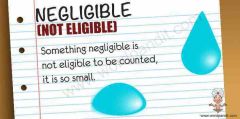
neg·li·gi·ble \ˈnɛglɪʤəbəl\ adjective
[more neg*li*gi*ble; most neg*li*gi*ble] : very small or unimportant
A negligible amount of damage was done to the vehicle.
The price difference was negligible.
neg·li·gi·bly \ˈnɛglɪʤəbli\ adverb
The difference between the prices was negligibly small.
Synonyms: inconsequential, inconsiderable, insignificant, measly, minute, nominal, paltry, petty, picayune, piddling, slight, trifling, trivial
Antonyms: big, consequential, considerable, important, material, significant |
Nieistotny, mało ważny, bez znaczenia |
|
|
sustainable |

sus·tain·able \səˈsteɪnəbəl\ adjective
[more sus*tain*able; most sus*tain*able]
1 : able to be used without being completely used up or destroyed sustainable energy resources a sustainable water supply
2 : involving methods that do not completely use up or destroy natural resources sustainable agriculture/farming/techniques
3 : able to last or continue for a long time sustainable development/growth
sus·tain·abil·i·ty \səˌsteɪnəˈbɪləti\ noun [noncount] sus·tain·ably \səˈsteɪnəbli\ adverb
Synonyms: defendable, defensible, justifiable, maintainable, supportable, tenable
Antonyms: indefensible, insupportable, unjustifiable, untenable |
Zrównoważony |
|
|
sparing |

spar·ing \ˈsperɪŋ\ adjective
: not using or giving a lot of something
an artist who is sparing in her use of color [=who does not use much color]
He has been sparing with details about his personal life. [=he has not talked much about his personal life]
spar·ing·ly \ˈsperɪŋli\ adverb
He used the funds only sparingly.
Synonyms: economical, economizing, provident, scrimping, frugal, thrifty
Antonyms: prodigal, wasteful |
Wstrzemięźliwy, oszczedny, ekonomiczny, skompy
|
|
|
loop |

Noun 1 [count] a : a curved part or shape made when something long and thin (such as a rope or thread) bends so that it touches or crosses over itself
a closed loop of rope a wire with a loop at the end a loop of string/thread
loop verb 1 : to form or cause (something) to form a loop [no obj]
The road loops around the pond. The necklace is long enough to loop twice around my neck. [+ obj] She looped a string around her finger. He sat with his arms looped around his knees.
2 : to move or cause (something) to move in a high curving path
[no obj] The ball looped over the shortstop's head into left field for a single. The batter hit a looping single to left field. [+ obj]
The batter looped a single to left field. The quarterback looped a pass downfield.
Other forms: loops; looped; loop·ing loop the loop : to perform a loop in an airplane
Synonyms: circle, circumnavigate, compass, girdle, girth, encircle, orbit, ring, round |
pętelka, pętla, oczko, szlufka robić pętlę zakręcać (o drodze, rzece) |
|
|
vessel |

noun [count] 1 formal : a ship or large boat a fishing/sailing vessel
2 technical : a vein or artery that carries blood through the body : blood vessel
3 somewhat old-fashioned : a hollow container for holding liquids
a drinking vessel
Other forms: plural ves·sels Synonyms: boat, ship |
Okręt, statek, naczynie, pojemnik |
|
|
persistence |

noun
1 : the quality that allows someone to continue doing something or trying to do something even though it is difficult or opposed by other people
He admired her dogged persistence in pursuing the job.
His persistence in asking for a raise was finally rewarded.
She has shown a lot of persistence.
2 : the state of occurring or existing beyond the usual, expected, or normal time — usually + of
The persistence of the rash worried him.
Synonyms: continuance, durability, endurance
Antonyms: ending, termination |
rzeczownik wytrwałość, uporczywość, wytrzymałość trwałość, stałość
poświata (ekranu) Słownik nowych technologii
przetrwanie (np. przeciwciał, odporności) Słownik medyczny
upór, wytrwałość, wytrzymałość trwałość |
|
|
elution |

In analytical and organic chemistry, elution is the process of extracting one material from another by washing with a solvent; as in washing of loaded ion-exchange resins to remove captured ions. |
Elucja (eluowanie) – proces wymywania za pomocą eluentu (tzw. fazy ruchomej) substancji adsorpcjowanej wcześniej na fazie stałej (stacjonarnej). Faza wypływająca z fazy stałej to eluat[1]. W chromatografii gazowej elucję przeprowadza się za pomocą gazu nośnego, a w chromatografii cieczowej za pomocą rozpuszczalników ciekłych. Zastosowanie odpowiednich warunków elucji jest podstawą powodzenia procesu chromatografii. |

